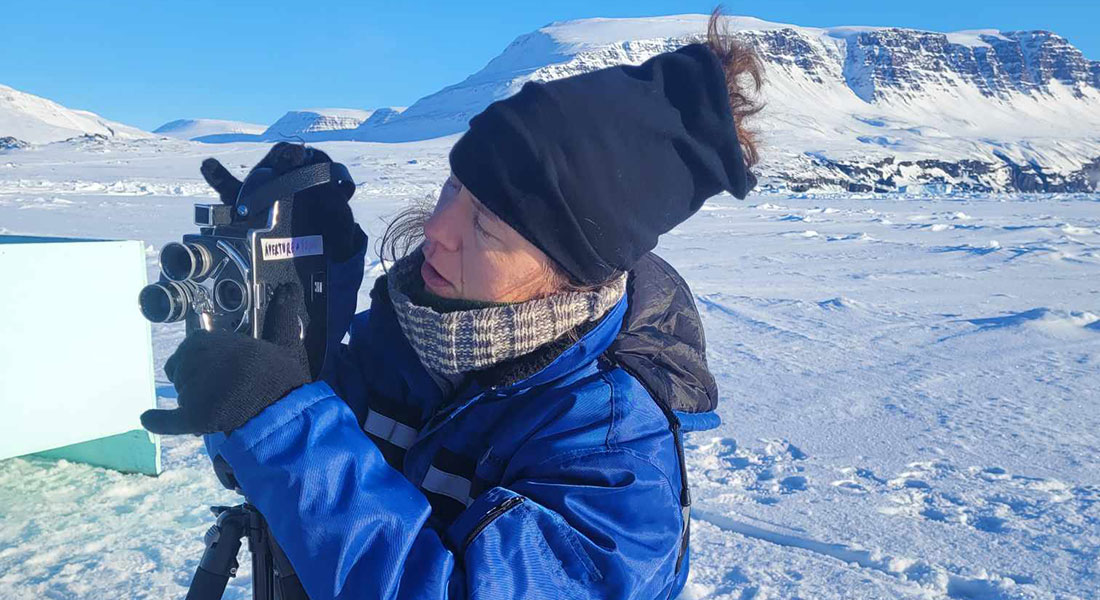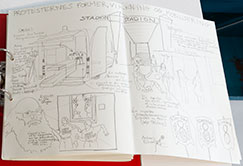Post-Future Essayism
Talk by Eva la Cour, Department of Arts and Cultural Studies and CApE, University of Copenhagen
 Through involvement in marine biologists’ studying copepods in western Kalaallit Nunaat at a time when Danish colonial history and colonial relations have become part of public debates, this talk seeks to tie science-driven questions to heuristic and critical models of practice. That is, practices that are not usually associated with collaborative projects between art and science, and that ultimately seek to challenge the ideologies of knowledge production of Western science.
Through involvement in marine biologists’ studying copepods in western Kalaallit Nunaat at a time when Danish colonial history and colonial relations have become part of public debates, this talk seeks to tie science-driven questions to heuristic and critical models of practice. That is, practices that are not usually associated with collaborative projects between art and science, and that ultimately seek to challenge the ideologies of knowledge production of Western science.
The talk is centred around post-future essayism. Post-future essayism as methodology and epistemological strategy in visual artistic research practice. Hence, the term signals my urge for the possibility of a futurity different from the kind of future that contemporary conditions for artistic production enable me to imagine and describe as the effect of my work. That is, I am less concerned with imagining a given future than with expanding the possibilities of living. Thus, post-future essayism also signals the value of trying – the French word ‘essayer’ means ‘to try’.
 Ultimately it is about survival. In times when the overarching risk of a climate collapse can only be improved through enormous collective effort, what is the epistemic and ethical status of audiovisual productions? Informed by the intellectual history of the essay film in the 20th century and its role in the visual arts, at stake is a (re)invention of more collectively negotiated forms and expressions of essayism. Hence, during the talk I will show examples of artistic work with process-oriented filmmaking and speak about my current postdoctoral project, affiliated with CApE (2025-2027). The project is anchored in my longstanding interest in image production in and about Arctic terrains with colonial histories and their figures - the 'scientist', the 'artist', 'locals'. The outset of the project is thus my own experiences of discomfort with the inadequate language that the traditional artist figure has at its disposal in the production of the Arctic, and an urge to renounce self-righteous and essentializing climate crisis rhetorics, in favour of more incongruous, situated and sensitive rhetorics.
Ultimately it is about survival. In times when the overarching risk of a climate collapse can only be improved through enormous collective effort, what is the epistemic and ethical status of audiovisual productions? Informed by the intellectual history of the essay film in the 20th century and its role in the visual arts, at stake is a (re)invention of more collectively negotiated forms and expressions of essayism. Hence, during the talk I will show examples of artistic work with process-oriented filmmaking and speak about my current postdoctoral project, affiliated with CApE (2025-2027). The project is anchored in my longstanding interest in image production in and about Arctic terrains with colonial histories and their figures - the 'scientist', the 'artist', 'locals'. The outset of the project is thus my own experiences of discomfort with the inadequate language that the traditional artist figure has at its disposal in the production of the Arctic, and an urge to renounce self-righteous and essentializing climate crisis rhetorics, in favour of more incongruous, situated and sensitive rhetorics.
